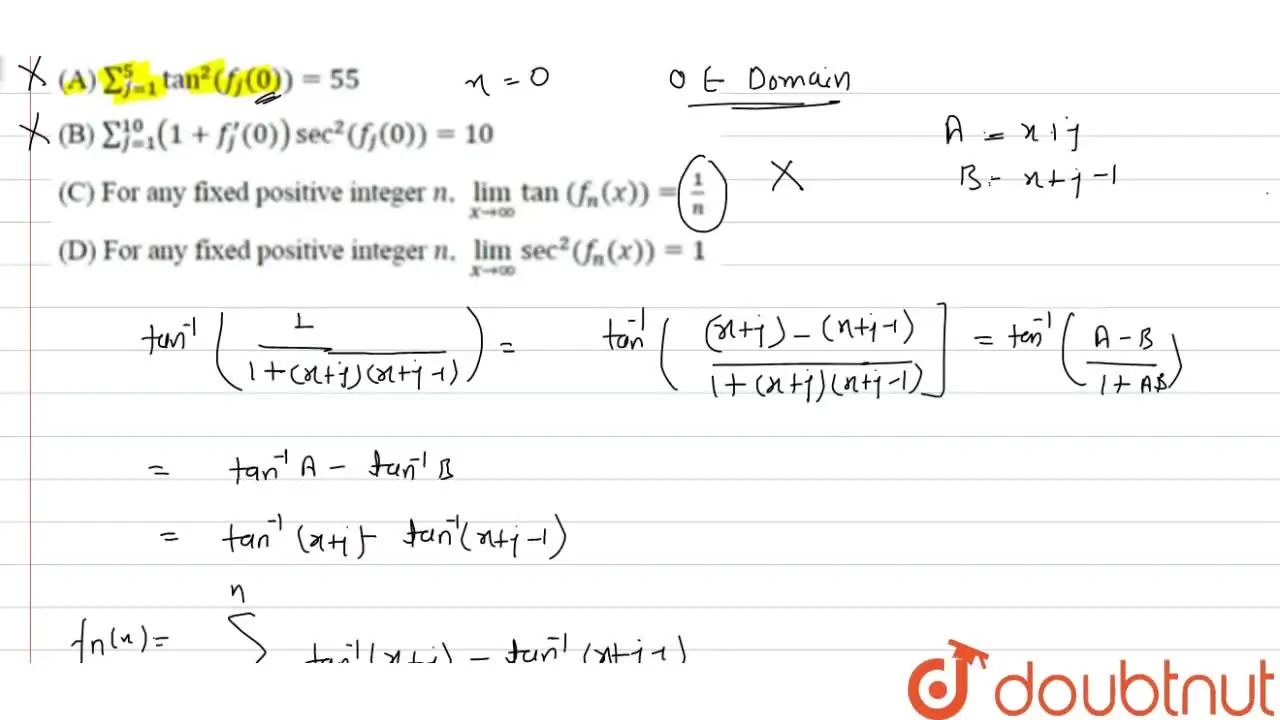For any positive integer n , define fn:(0,∞)→R as fn(x)=n∑j=1tan−1(11+(x+j)(x+j−1)) for all x∈(0,∞) . Here, the inverse trigonometric function tan−1x assumes values in (−π2,π2). Then, which of the following statement(s) is (are) TRUE? 5∑j=1tan2(fj(0))=55 (b) 10∑j=1(1+fj'(0))sec2(fj(0))=10 (c) For any fixed positive integer n , (lim)x→∞tan(fn(x))=1n (d) For any fixed positive integer n , (lim)x→∞sec2(fn(x))=1
Step by step video & image solution for For any positive integer n , define f_n :(0,oo)rarrR as f_n(x)=sum_(j=1)^ntan^(-1)(1/(1+(x+j)(x+j-1))) for all x in (0, oo) . Here, the inverse trigonometric function tan^(-1)x assumes values in (-pi/2,pi/2)dot Then, which of the following statement(s) is (are) TRUE? sum_(j=1)^5tan^2(f_j(0))=55 (b) sum_(j=1)^(10)(1+fj '(0))sec^2(f_j(0))=10 (c) For any fixed positive integer n , (lim)_(xrarroo)tan(f_n(x))=1/n (d) For any fixed positive integer n , (lim)_(xrarroo)sec^2(f_n(x))=1 by Maths experts to help you in doubts & scoring excellent marks in Class 12 exams.
Similar Questions
For any positive integer n . let Sn:(0,∞)→R be defined by
Sn(x)=n∑k=1Cot−1(1+k(k+1)x2x)
where for any x∈R,cot−1x∈(0,π)andtan−1(x)∈(−π2,π2).Then which of the following statement is(are TRUE ?View Solutionlet f(x)=limn→∞x2n−1x2n+1
View SolutionIf x0=∞∑n=1tan−1(4nn4−2n2+3), then which of the following is/are correct
View SolutionIf f(x)=(a−xn)1/n where a>0 and n∈N , then f[f(x)] is equal to :
View SolutionIf f(x)=(p−xn)1n ,p>0 andn is a positive integer then f[f(x)] is equal to
View SolutionIf f'(x)=tan−1(Secx+tanx),x∈(−π2,π2) and f(0)=0 then the value of f(1) is
View SolutionIf m and n are positive integers and f(m,n)=∫10xn−1(logx)mdx, then f(m,n) is equal to
View SolutionIf f(x)=limn→∞(n(x1/n−1)) for x>0, then which of the following is/are true?
View SolutionIf f(x)=Σnr=1tan−1(1x2+(2r−1)x+(r2−r+1)) , then ∣∣limn→∞f'(0)∣∣ is
View Solutionf(x)=limn→∞sin2n(πx)+[x+12], where [.] denotes the greatest integer function, is
View Solution


